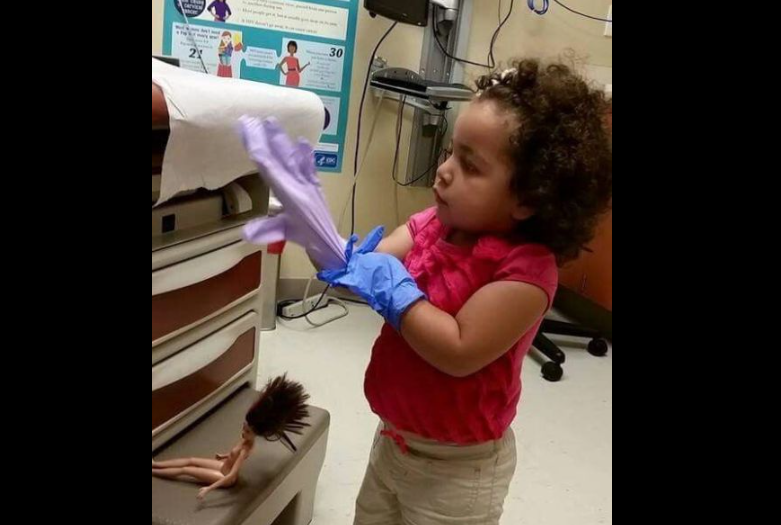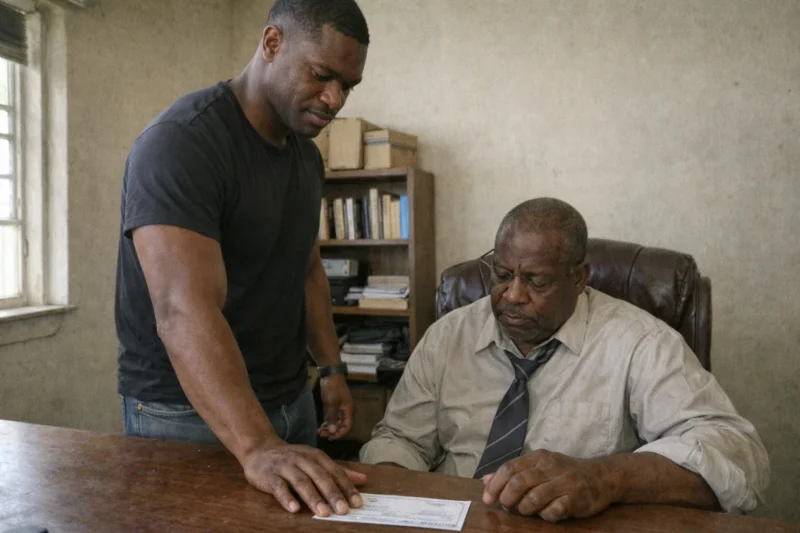In the quiet hum of the waiting room, my daughter occupied herself with playful purpose while I anticipated the nurse’s call. Latex gloves stretched halfway up her small arms, her face set in a determined frown, as if she were on an important mission. She’d brought along her doll, Miss Tina, and was conducting a thorough check-up on a step stool, her tiny hands moving with care.
It was endearing. I couldn’t resist capturing the moment with a quick photo. Her focus was intense, her fingers gently tapping Miss Tina’s knee with a tongue depressor, mimicking a doctor’s precision.
Then she spoke, her voice clear and steady: “Now I check for secret hurt. Like Grandma’s.”
The words stopped me cold.
My mother had passed years earlier, her struggles never labeled as “secret hurt.” Not in conversation, not in any way I’d shared.
I leaned forward, my voice soft but urgent. “What do you mean, sweetheart?”
She continued her work, unfazed. “The part you hide when you cry standing up.”
My breath caught. I hadn’t shared anything about my mother’s illness with her. Not the endless appointments, not the quiet confessions in a hospital room where the blinds blocked out the world and the machines beeped too loudly. My daughter, only three years old, couldn’t possibly know about those final days. Could she?
I tried to dismiss it. Perhaps she’d caught a snippet of conversation, a phrase from a movie I’d watched late at night, or maybe it was just her vivid imagination at play. Children often surprised me with their creativity.
But the thought lingered, growing heavier. “Secret hurt” wasn’t a phrase she’d likely stumbled upon. And the calm certainty in her voice—like she’d spoken it countless times—unsettled me.
“Sweetheart, what’s secret hurt?” I asked again, striving for a light tone.
She glanced up, still cradling Miss Tina. “It’s the part you don’t say out loud. The part that hurts even when you’re not crying.” She paused, then added, “Like Grandma’s.”
My throat tightened. Panic crept in, though I fought to keep it hidden. I’d been so careful to shield her from the weight of my grief, from anything too heavy for her young heart. Yet here she was, speaking with a clarity that felt far beyond her years.
I shifted in my seat, glancing at the door, the walls suddenly feeling closer. How much had I buried? And for how long?
“Where did you hear that, sweetie?” I asked, hoping it was simply a spark of her boundless imagination.
She met my gaze, her big brown eyes steady, as if measuring her words. “From Grandma,” she whispered.
The word “Grandma” struck like a blow. It was impossible. My daughter had never met her grandmother—Mom had passed when she was still a baby. Yet her words carried a quiet conviction that sent a shiver through me.
I stood abruptly, my hands trembling. “Let’s get some juice,” I said, my voice unsteady. “We need to talk about something else.”
I needed space to process. I needed to understand how my little girl, who had never known my mother, could speak of her with such certainty. The possibilities swirled in my mind, each more unsettling than the last.
We sat at a small table in the corner of the waiting room, her sipping juice and humming softly, oblivious to the storm she’d stirred in me.
“Mommy?” she asked suddenly, pulling me from my thoughts. “Where’s Grandma now?”
I froze again. I hadn’t mentioned Grandma in months, maybe longer. How did she know to ask?
“She’s… gone, sweetheart,” I said, my voice barely above a whisper. “She’s in heaven now, watching over us.”
My daughter studied her juice cup, her fingers tracing its edge. Then she looked up, her eyes wide and earnest. “Does Grandma miss me?”
I nodded, blinking back tears. “Yes, baby. She misses you. And she loves you so much.”
She nodded slowly, as if processing a truth too vast for her small frame. Just when I thought the moment had passed, she spoke again. “Does she know about secret hurt?”
The question stole my breath. I wasn’t prepared for this—not at all. But the words hung in the air, undeniable.
“Let’s focus on playing, okay?” I said, trying to keep my voice steady. “We don’t need to think about that right now.”
She nodded, her attention drifting back to Miss Tina, now sprawled dramatically on the step stool. She administered another pretend injection, murmuring softly as she worked.
But my mind wouldn’t settle. Was she echoing something from my mother’s illness? Was it a feeling, a connection, something more? I couldn’t shake the sense that I was missing something profound, something beyond a child’s imagination.
Finally, the nurse called my name. I stood, still caught in a haze of questions. “Let’s go, sweetheart,” I said, gripping her hand tightly.
She followed, clutching Miss Tina, as we walked down the hallway to the exam room. Exhaustion hit me—not just from the wait, but from the weight of the unknown, the sense that something had shifted in a way I couldn’t grasp.
The doctor arrived soon after we settled in. We went through the routine: vitals, updates, small talk. But my thoughts kept circling back to my daughter’s words. “Secret hurt” echoed relentlessly.
Was there a chance she felt some tie to my mother? Something beyond reason?
I didn’t know. The uncertainty frightened me.
Then the doctor offered an unexpected insight. As she handed me my prescription, she smiled warmly. “Your daughter is more perceptive than you might realize. I see it often—children like her are sensitive, almost intuitive.”
I frowned. “What do you mean?”
She leaned back, her expression thoughtful. “Children often sense emotions, even ones we don’t share openly. They pick up on things and express them in their own way—through play, drawings, or words. It’s possible she’s reflecting something she feels from you.”
Her words struck a chord. It was as if she’d seen straight into my heart.
“So, you think she might be sensing… my feelings? About my mom?” I asked quietly, piecing it together.
The doctor nodded. “Exactly. Kids can mirror their parents’ emotions, even the ones we think we’ve hidden. It comes out in ways that can surprise us.”
Relief washed over me, mingling with a new clarity. Perhaps it wasn’t a mysterious connection to my mother. Perhaps my daughter was simply reflecting the grief I’d carried, the pain I’d buried to protect her.
The realization hit hard. I hadn’t fully grieved my mother’s loss. I’d pushed it down, locked it away, thinking I was shielding my daughter. But in doing so, I might have passed that weight to her unknowingly.
I took a deep breath, the weight of it settling in.
“Thank you,” I told the doctor. “You’ve given me a lot to think about.”
As we left the office, a quiet resolve grew within me. My daughter didn’t need to carry my pain. Neither did I. It was time to face it, to heal, so we could both move forward.
For the first time in years, a spark of hope flickered. Maybe it wasn’t too late to find peace.
Life has a way of revealing truths when we least expect them. Sometimes, clarity comes from the most unlikely sources—a child’s innocent play or a moment of quiet honesty.
Embrace the chance to heal, no matter how daunting it feels. A small moment, like a three-year-old tending to her doll, can unlock a path to understanding you didn’t know you needed.
If this story resonated with you, please share it and like the post. You never know who might find comfort in these words today.




